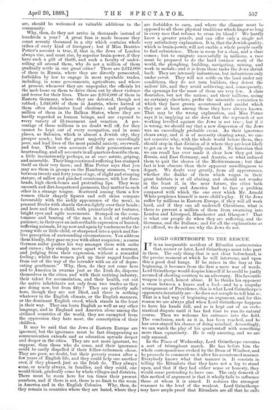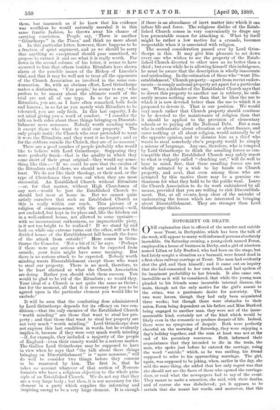LORD GRIMTHORPE TO THE RESCUE.
T is an inseparable accident of Ritualist controversies that, sooner or later, Lord Grimthorpe must take part in them. The only thing that is not clear beforehand, is the precise moment at which he will intervene, and upon this a good deal hangs. If he mixes in the fray at the beginning, it becomes from the first a mere war of words. Lord Grimthorpe would despise himself if he could be justly accused of showing courtesy to an adversary. His favourite weapon is good, honest abuse. If he thinks his opponent a cross between a knave and a fool—and by a singular arrangement of Providence, this is what Lord Grimthorpe's opponents invariably are—he does not scruple to tell him se. That is a bad way of beginning an argument, and for this reason we are always glad when Lord Grimthorpe happens to have his hands full, and so is kept out of an eccle- siastical dispute until it has had time to run its natural course. Then we welcome his entrance into the field. The conclusion, such as it is, has been reached, and he has over-stayed his chance of doing mischief. Accordingly, we can watch the play of his quarterstaff with something more than equanimity. He is only amusing, and we are only amused.
In the Times of Wednesday, Lord Grimthorpe executes a sort of triumphant march. He has before him the whole correspondence evoked by the Dean of Windsor, and he proceeds to comment on it after his accustomed manner. Everybody knows what that manner is. It consists in telling the Ritualists that they have not a leg to stand upon, and that if they had either sense or honesty, they would cease pretending to have one. The only demerit of this method of argument is that it wholly fails to influence those at whom it is aimed. It reduces the strongest reasoner to the level of the weakest. Lord Grimthorpe may have ample proof that Ritualists are all that he calls them, but inasmuch as if he knew that his evidence was worthless he would naturally marshal it in this same frantic fashion, he throws away his chance of carrying conviction. People say, There is another " Grimthorpe " in the Times,' and think no more about it. In this particular letter, however, there happens to be a fraction of quiet argument, and as we should be sorry that anything so exceptional should pass unnoticed, we propose to extract it and see what it is really worth. Far down in the second column of his letter, it seems to have occurred to him that others besides Ritualists have shown alarm at the possible issues of the Bishop of Lincoln's trial, and that it may be well not to treat all the opponents of the Church Association as involved in the same con- demnation. So, with an obvious effort, Lord Grimthorpe makes a distinction.'You people,' he seems to say, who profess to be uneasy about the ultimate result of the trial are not all of one type. In so far as you are Ritualists, you are, as I have often remarked, both fools and knaves ; in so far as you merely wish Ritualists to be tolerated, you are only fools. In this last capacity, I do not mind giving you a word of comfort. "I consider the talk on both sides about these things bringing on Disestab- lishment mere nonsense. Nobody worth minding wants it except those who want to steal our property." The only people inside the Church who ever pretended to want it were the Ritualists, and they want it no longer ; and as for the robbers outside the Church, they are of no account.'
There are a good number of people probably who would like to believe with Lord Grimthorpe. Supposing they were perfectly frank—that is the quality in which they come short of their great original—they would say some- thing like this :—' If we could be sure that the exodus of the Ritualists ended there, we should not mind, it in the least. We do not like their theology, or their zeal, or the type of Churchman they turn out when they are most successful. An Established Church without Ritualists —or, for that matter, without High Churchmen of any sort—would be just the Established Church we should feel most at home in. But we cannot quite satisfy ourselves that such an Established Church as this is really within our reach. This picture of a religion of common-sense, with the supernatural—well, not excluded, but kept in its place and, like the kitchen cat in a well-ordered house, not allowed to come upstairs— with no inconvenient enthusiasm, no impracticable piety. is it not too bright to be realised ? If we stand by and look on while one extreme turns out the other, will not the divided house of the Establishment fall beneath the force of the attack from outside ? ' Here comes in Grim- thorpe the Consoler. Not a bit of it,' he says. 'Perhaps if there were any serious attack to be expected from outside, your fears might have some meaning. But there is no serious attack to be expected. Nobody worth minding wants Disestablishment except those who want to steal our property. There is no need, therefore, to be the least alarmed at what the Church Association are doing. Rather you should wish them success. You would be glad to be rid of the Ritualists ; so would they. Your ideal of a Church is not quite the same as theirs ; but for the moment, all that it is necessary for you to be agreed upon is the particular element you would like to exclude.'
It will be seen that the comforting dose administered by Lord Grimthorpe depends for its efficacy on two con- ditions,—that the only enemies of the Established Church "worth minding" are those that want to steal her pro- perty ; and that those that want to steal her property are not very much "worth minding." Lord Grimthorpe does not express this last condition in words, but he evidently implies it, because if they were very much worth minding —if, for example, they included a majority of the people of England—even their enmity would be a serious matter. The Gallios Lord Grimthorpe may be supposed to have in view when he says that "the talk about these things bringing on Disestablishment" is "mere nonsense," will do well to consider two things before they consent to be reassured by him. The first is, that he takes no account whatever of that section of Noncon- formists who have a religious objection to the whole prin- ciple of an Established Church. We do not say that they are a very large body ; but then, it is not necessary for the element in a party which supplies the informing and inspiring energy to be a very large element. It is enough if there is an abundance of inert matter into which it can infuse life and force. The religious dislike of the Estab- lished Church comes in very conveniently to drape any less presentable reason for attacki g it What by itself might be rather a, low motive for a crusade, becomes respectable when it is associated with religion. The second consideration passed over by Lord Grim- thorpe is this. It may give him pleasure to set down every one who wishes to see the property of the Estab- lished Church diverted to other uses as no better than a thief ; but even while he is allowing himself this indulgence, he must be aware that the description is wholly inaccurate and misleading. In the estimation of those who "want Dis- establishment," Church property—apart from recent endow- ments—is simply national property set apart for a particular use. When a defender of the Established Church says that to divert this property to another use is robbery, he ordi- narily means nothing more than that he likes the use to which it is now devoted better than the use to which it is proposed to devote it. That is our position. We would very much rather that Church property should continue to be devoted to the maintenance of religion than that it should be applied to the provision of elementary schools or to paying of the National Debt. But a man who is enthusiastic about education or about finance, and cares nothing at all about religion, would naturally be of the opposite opinion, and to dismiss him as a thief who wants to steal somebody else's property would be simply a misuse of language. Any one, therefore, who is tempted by Lord Grimthorpe to think the assailing forces so con- temptible that the Established Church may safely resort to what is vulgarly called "chucking out," will do well to bear in mind, first, that these assailing forces are not wholly actuated by a wish to lay hands on Church property, and next, that even among those who are actuated by this motive there may be a genuine en- thusiasm for what they hold to be the public weal. Leave the Church Association to do its work unhindered by all means, provided that you are willing to risk Disestablish- ment. But, at all events, keep clear of the mistake of underrating the forces which are interested in bringing about Disestablishment. They are stronger than Lord Grimthorpe thinks.



































 Previous page
Previous page